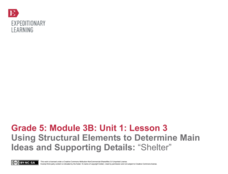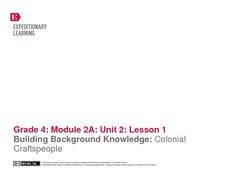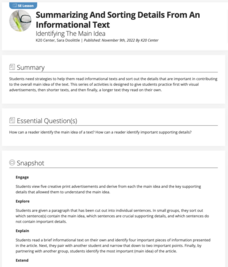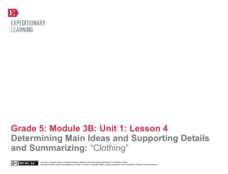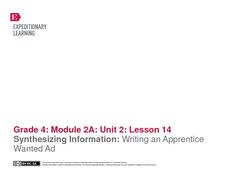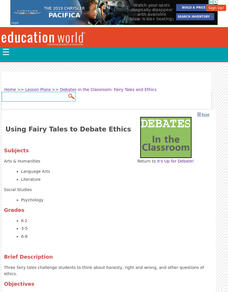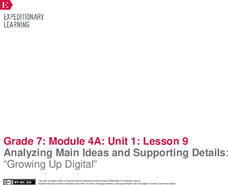Olathe Public Schools
Topic, Main Idea, Supporting Detail, and Theme
Get your class members thinking about a reading passage's topic, main idea, supporting details, and theme with this interactive presentation that asks scholars to define, locate, and review each term.
EngageNY
Using Structural Elements to Determine Main Ideas and Supporting Details: “Shelter”
Does the picture tell the story? Learners continue their work in The Inuit Thought of It by creating a visual gist of pages 16 and 17. They then complete a main idea graphic organizer and discuss key supporting details.
EngageNY
Building Background Knowledge: Colonial Craftspeople
In the first lesson plan of this unit on colonial trade, fourth graders gain background knowledge of different jobs performed by early colonists. The class begins with a slide show presentation that includes a variety of great...
EngageNY
Mid-Unit Assessment: Close Reading of Bullfrog at Magnolia Circle: Bullfrog Life Cycle
The sixth lesson plan in this Bullfrog at Magnolia Circle unit assesses your third graders' ability to read and understand informational text. The included assessment asks learners to take notes about the main idea and supporting...
K20 LEARN
Summarizing and Sorting Details from an Informational Text: Identifying the Main Idea
Scholars participate in two activities that teach them to identify the main idea and key supporting details in informational text. Partners create a visual that reflects the main idea and key supporting details in an informational text...
Houghton Mifflin Harcourt
Family Time: Extra Support Lessons (Theme 5)
Provide extra support with a unit that follows a teach, blend, guided practice, and practice/apply routine to reinforce reading, grammar, vocabulary, and writing skills. Reading and writing lessons include supporting details,...
Crabtree Publishing
The Genius of the Ancients
It is said that necessity is the mother of invention. Fifth graders prove this with help from three lessons that examine how ancient cultures used their needs to drive innovations. In lesson one, pupils identify main ideas and supporting...
DePaul University
Learn about Fables
Expose young readers to a new genre of fiction with a short reading passage. After learning about fables, children identify the main idea and supporting details in preparation for writing a short summary. Read the text as a class,...
Achieve3000
Listening for Main Idea and Supporting Details
Did you hear that? It's the main idea! Teach your class listening and note-taking strategies for determining the main idea by following the steps provided in this plan.
CC Homestead
Summarize
Designed for third graders but appropriate for older learners as well, this packet of materials underscores the necessity of teaching kids how to summarize, how to identify main ideas and supporting details, and how to ask questions...
EngageNY
Identifying Main Ideas and Supporting Details: What’s Going On in the Teenage Brain?
What's going on in the teen brain? Pupils consider the question as they continue reading an informational article about the topic. While reading, they use a Thinking Log worksheet and an anchor chart to track their understanding of...
EngageNY
Determining Main Ideas and Supporting Details and Summarizing: “Clothing”
Surviving winter. Pupils begin reading on page 18 of The Inuit Thought of It: Amazing Arctic Inventions and sketch how the people used animal skin clothing to survive the winter. Readers complete a main idea graphic organizer...
EngageNY
Continued Close Reading of Bullfrog at Magnolia Circle: Text-Dependent Questions and Vivid Words and Phrases
As 3rd graders continue reading Bullfrog at Magnolia Circle, they focus on the concepts of predator and prey in the fifth lesson plan of this unit. Scholars further develop their ability to answer questions using evidence from the text...
EngageNY
Continued Close Reading of Bullfrog at Magnolia Circle: Text-Dependent Questions and Vivid Words and Phrases
In the third activity from this unit based on the book Bullfrog at Magnolia Circle, learners focus on using specific details from the text-to-answer questions about the habitat of bullfrogs. While reading the text, young...
EngageNY
Close Reading of Bullfrog at Magnolia Circle: Main Ideas about the Bullfrog
As your class reaches the end of the book Bullfrog at Magnolia Circle, the seventh lesson in this literary unit helps third graders transition from reading narrative to expository writing. Scholars develop their note-taking skills...
EngageNY
Synthesizing Information: Writing an Apprentice Wanted Ad
Fourth graders view examples of help-wanted ads as they plan and create their own writing in the fourteenth instructional activity of this unit on colonial trade. The engagement of the class is captured when the teacher shares an actual...
Curated OER
Comprehension: Identify the Main Idea from Text
Children in first grade listen and read along with the teacher to practice main idea identification. They use the provided reading passages to read, locate the main idea and supporting details. This is a fully scripted lesson which means...
Curated OER
Reintroduce: Main Idea
What would a main idea be without important details? Readers use a graphic organizer to record key details from an informational text (a fiction text would also work). Review main idea as a concept before beginning, asking scholars...
Curated OER
Elaborating the Main Idea, Using Supporting Details
A desk is used as a visual analogy to construct the main idea and supporting details in a story. The top of the desk is the main idea, and each of the four legs provides supporting details. The legs of the desk provide support for the...
EngageNY
Taking Notes Using a Graphic Organizer: Inferring About Work and Play in Colonial America
What was life like in colonial America? Follow this lesson and your pupils will find out what people in colonial times did for work and for fun. Ask learners to compare and contrast the two texts and explain what the reading helped them...
Curated OER
Using Fairy Tales to Debate Ethics
Is trickery ever justified? Is it okay to steal from someone who has stolen from you? Puss, from Puss in Boots, and Jack, from Jack and the Beanstalk, might have some ideas about these ethical questions. After listening to a series of...
Curated OER
Comprehension: Compare and Contrast Topics in Two Texts
A scripted instructional activity can be a big help for new teachers. This fully scripted three-day learning activity provides teachers with the means to demonstrate how to compare and contrast two topics in two texts. Learners will work...
EngageNY
Analyzing Main Ideas and Supporting Details: “Growing Up Digital”
Young scholars continue their exploration of adolescent brain development by reading an informational text, "Growing Up Digital," by Matt Richtel. Then, with partners, they complete note-catcher worksheets to capture the article's main...
Curated OER
Using Details From The Text
Begin this expository writing activity by reading a non-fiction book of your choice and modeling expository writing. The plan suggests The Trip of a Drip by Vicki Cobb but notes that other texts will work. Learners then choose a...
Other popular searches
- Main Idea Supporting Details
- Main Idea & Supporting Details
- Identifying Supporting Details
- Finding Supporting Details
- Writing Supporting Details
- Main Ideas Supporting Details
- Main Ideas. Supporting Details
- Main Idea/supporting Details
- Paragraph Supporting Details
- Details and Supporting Ideas
- Supporting Details Worksheets
- Main Idea, Supporting Details

